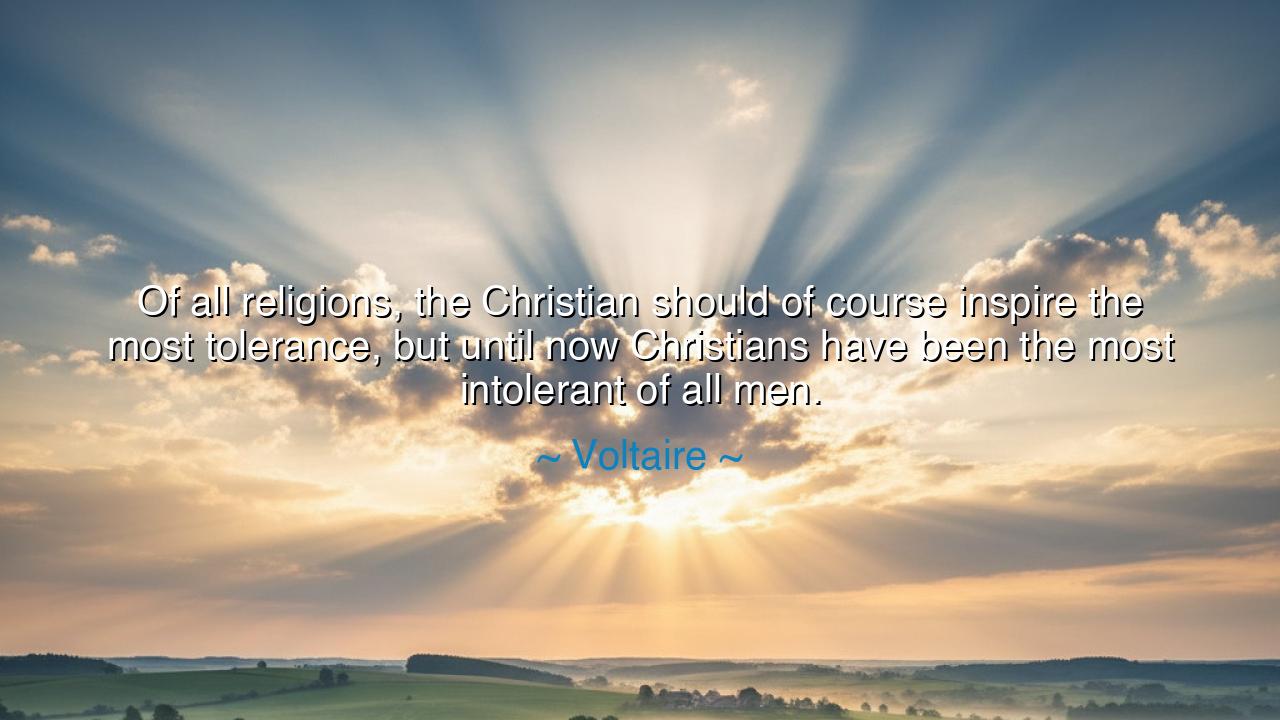
Of all religions, the Christian should of course inspire the most
Of all religions, the Christian should of course inspire the most tolerance, but until now Christians have been the most intolerant of all men.






"Of all religions, the Christian should of course inspire the most tolerance, but until now Christians have been the most intolerant of all men." These words from Voltaire strike at the heart of the contradiction between Christian teachings and the historical actions of those who have claimed to follow them. Christianity, a religion founded on the teachings of love, forgiveness, and compassion, calls upon its followers to tolerate and accept all people, regardless of their differences. And yet, throughout history, Christians have often been at the forefront of intolerance, engaging in acts of persecution, violence, and exclusion in the name of their faith. Voltaire’s criticism is not a rejection of Christianity itself, but rather a call to reflect on how its principles have been so often misused in the pursuit of power and control.
In the ancient world, the concept of tolerance was rooted in philosophies that sought to understand the common humanity shared by all people. Socrates, for example, taught his followers to question everything, to seek truth through dialogue and reflection, embracing different perspectives without judgment. Similarly, Confucius in China emphasized the importance of respect for others, teaching that we should treat others with kindness, regardless of their background or beliefs. Tolerance was seen not just as a social virtue but as a way of nurturing harmony and understanding among people, laying the groundwork for societies that could thrive through mutual respect. Voltaire’s criticism of Christianity, then, points to a historical failure to embody these universal principles in the name of a faith that was supposed to be the paragon of love and peace.
The rise of Christianity in the Roman Empire brought with it a profound shift in the understanding of religious tolerance. Early Christians, persecuted for their beliefs, championed the idea of universal salvation and the value of every soul. However, after Constantine’s conversion to Christianity in the 4th century, the faith became entwined with political power, and tolerance gave way to intolerance. The Inquisition, Crusades, and witch hunts became emblematic of an era where Christians, rather than preaching peace and forgiveness, sought to force conformity through violence and coercion. During the Crusades, Christians waged war in the name of God, slaughtering those who did not share their beliefs and claiming divine justification for their actions. Voltaire’s observation that Christians have been among the most intolerant of all men finds its roots in this troubling history, where religion became a tool for empire and domination rather than a source of love and understanding.
Voltaire himself was a sharp critic of the Church and the religious dogma that dominated Europe in the 17th and 18th centuries. His philosophical writings, particularly Candide, satirized the hypocrisy of those who claimed to act in the name of Christian morality while committing acts of cruelty and oppression. Voltaire’s challenge was not just to the Christian faith, but to the broader institutionalization of religion, which he saw as an obstacle to reason and human freedom. His call for tolerance was grounded in a belief that human beings, in their shared humanity, should strive to live together in harmony, free from the tyranny of religious or political forces that sought to impose their will upon others.
In the modern era, the tension between religious principle and social practice continues to play out in the context of Christianity. While many Christian denominations advocate for love and acceptance, others have used religion to justify exclusionary practices, especially when it comes to issues like gender equality, LGBTQ+ rights, and interfaith relations. This contradiction between the message of Christ and the actions of certain Christian communities continues to be a point of contention, and Voltaire’s words remain as relevant as ever. Christianity, in its truest sense, should inspire us to look beyond our differences, to love our neighbors as ourselves, and to act with compassion and humility. But history and contemporary events show that this ideal has often been lost in the pursuit of power and influence.
The lesson Voltaire imparts is a timeless one: religion, no matter how noble its origins, can be twisted and misused for purposes of control and oppression. True tolerance is not a mere external act of acceptance, but an internal commitment to respect, understand, and value others as human beings. As we reflect on the relationship between faith and intolerance, we are called to ask: how can we, in our own lives, embody the true teachings of love, peace, and understanding that are central to many of the world’s great religions? How can we ensure that our actions reflect the compassion and justice that our beliefs espouse, rather than perpetuate the same patterns of intolerance and division?
In practical terms, this means that we must constantly strive to question the ways in which our beliefs are put into practice. We must challenge ourselves to act with humility and openness, to build bridges rather than walls, and to embrace dialogue rather than conflict. Whether in our communities, our workplaces, or our personal relationships, we must seek to practice the tolerance that Voltaire envisioned—an active, engaged respect for others, grounded in the shared dignity of all people. The path to a more just and peaceful world lies not in religious dogma, but in the universal values of love, understanding, and respect that transcend all boundaries.






AAdministratorAdministrator
Welcome, honored guests. Please leave a comment, we will respond soon